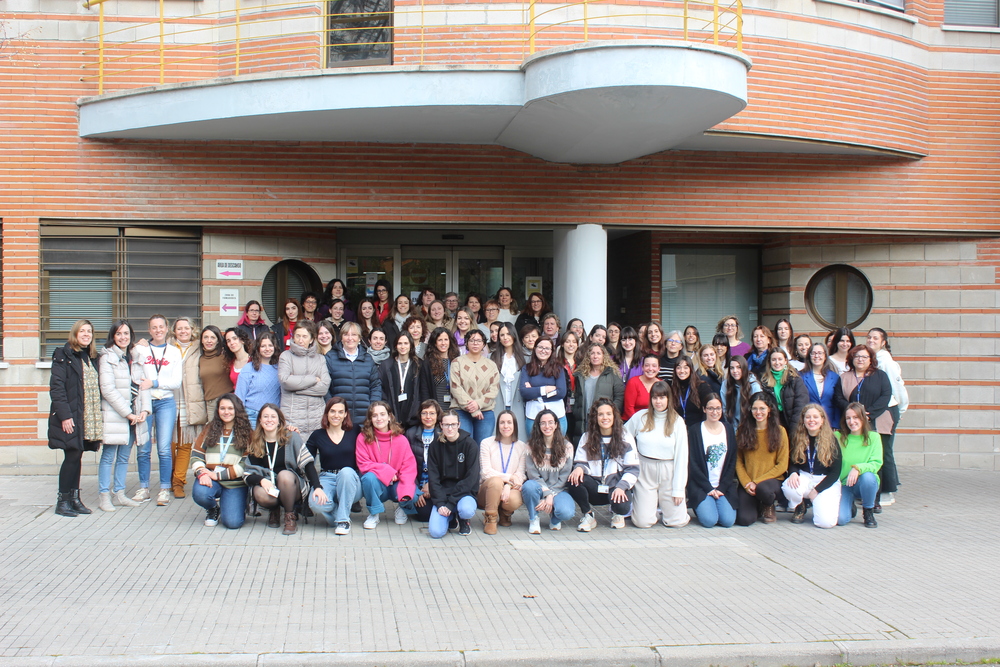-
Workshops for children, conferences, wine and neuroscience, meetings with scientists, interviews, and social networks have been the proposals of the IIBM for the 11F 2023 campaign. Nineteen activities have been carried out throughout the month of February.
-
Twenty-four researchers belonging to 13 research groups have participated this year to raise awareness of the role of women in the different stages of a scientific career and to promote interest in science among the younger public.
The Scientific Communication and Culture Unit of the Alberto Sols Institute for Biomedical Research (IIBM) has once again promoted the celebration of the International Day of Women and Girls in Science. A multitude of informative events have been organised, in a wide variety of formats, and the number of women scientists involved this year has been considerably higher than in 2022. Last year, 12 female researchers and Víctor Valcárcel (from Ana Guadaño's laboratory) took part, and this year there were 23 female scientists (and Víctor) responsible for publicising our work, showing society the passion for what we do in our laboratories and promoting scientific vocations in girls and teenagers. In addition, and very importantly, 11F also aims to pay tribute to women leaders in science. This year the IIBM has remembered our dear Gabriella Morreale, thanks to Soledad Bárez. Gabriella was a CSIC research professor at the IIBM and contributed enormously to science and society for her work on iodine and thyroid hormones, and for discovering their necessity for foetal brain development.

The nineteen activities carried out by our Institute's female researchers are presented below.
Several of our women scientists participated in 11F through ASEICA-MUJER and the "Conócelas 2023" programme. This year the aim was to present the "women behind the gown" who do cancer research (colloquially known as cancer detectives). "Conócelas" is one of the most high-impact educational and dissemination actions at national level. This year, four IIBM researchers participated in this initiative by giving lectures on their cancer projects, both in person and virtually. They are the researchers: Gema Moreno Bueno, Alicia González-Martín, Gemma Ferrer Mayorga and Ana Monfort Vengut.
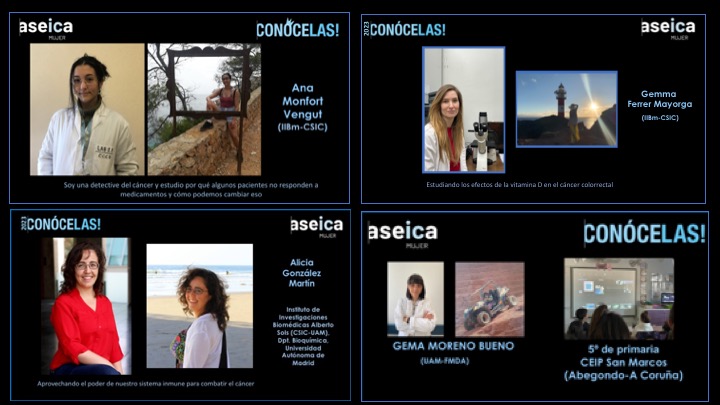
The IIBM also went "wine" with the event entitled: "Wine for Women in Neuroscience: Rare diseases and the brain. A road to travel". Ana Guadaño's entire group: Marina Guillén, Ana Montero, Víctor Valcárcel, Carmen Grijota and Soledad Bárez were the creators of this extraordinary proposal. They travelled to the Mirador del Arco de Cuchilleros, in the heart of Madrid, to talk about Neuroscience and the Allan-Herndon-Dudley syndrome, a rare disease due to mutations in the thyroid hormone transporter MCT8. This activity was a great success and they plan to repeat it next year.
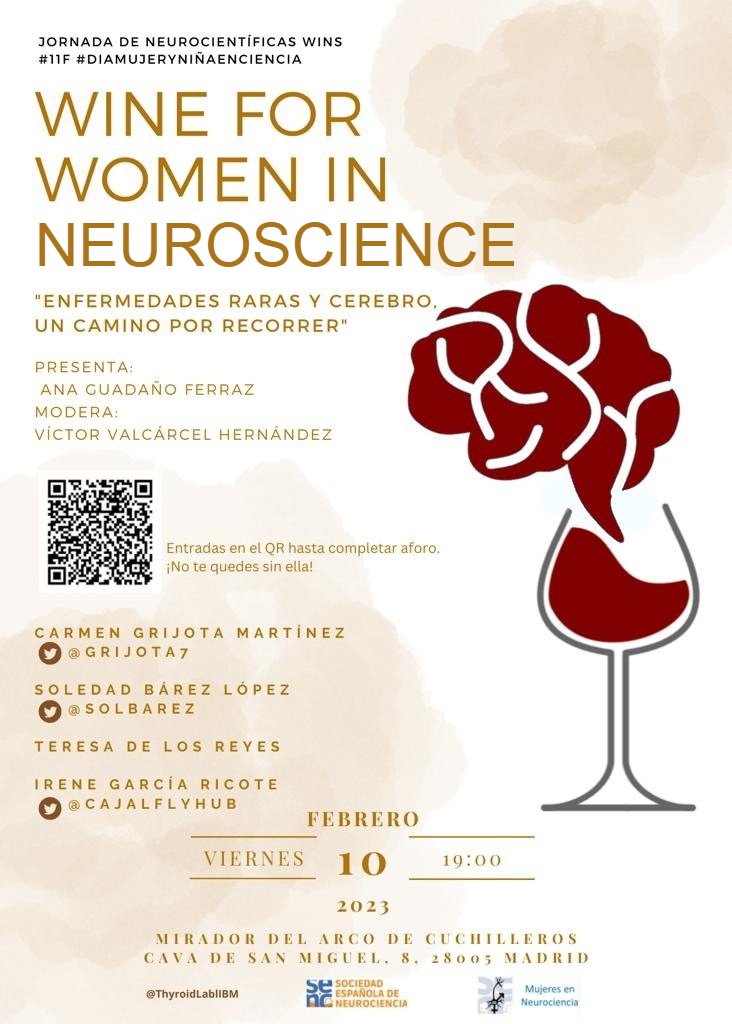
Soledad Bárez, not only participated in the aforementioned event, but also carried out two other activities for 11F. At the IES Francisco de Goya, she paid a well-deserved tribute to Dr. Gabriella Morreale by giving a lecture entitled "Do you know Gabriella Morreale? In addition, he visited an Infant and Primary School, CEIP Amador de los Ríos, to play with 3 and 5 year old children, proposing an entertaining scientific workshop. It was the first time that these children met a scientist.
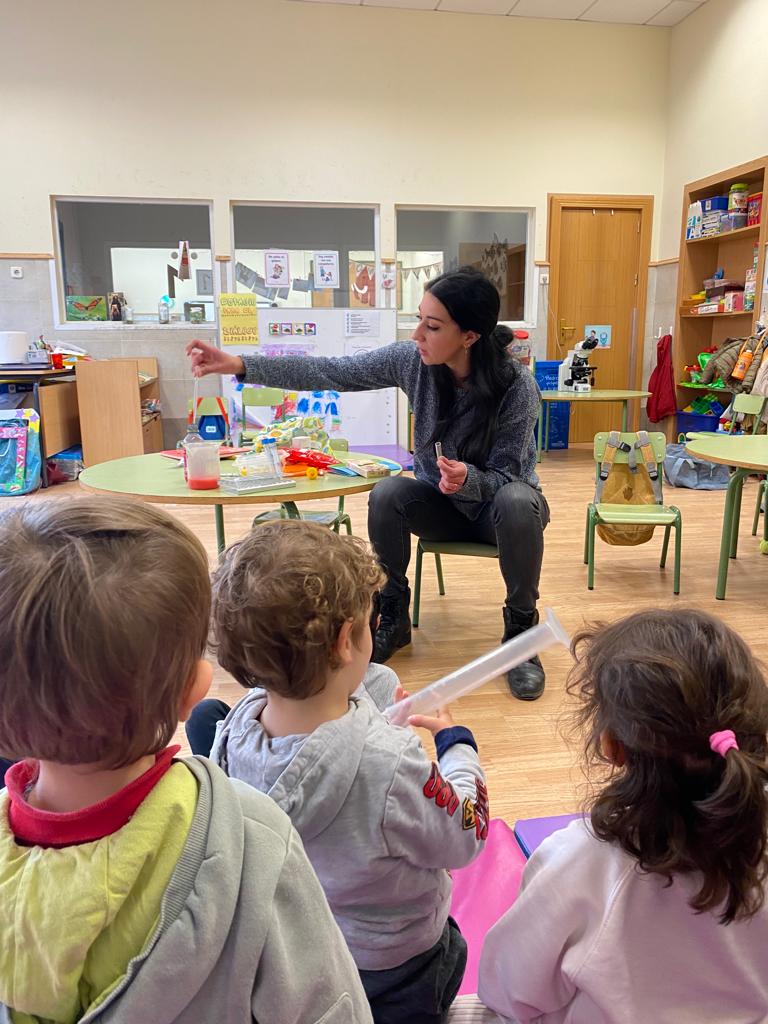
Alicia González-Martín, in addition to the programme "Conócelas 2023", was also interviewed via video-conference by first-year students of the Biomedical Sciences degree at the University of Cantabria. The aim of the students of Molecular Biology of the Cell was to present Alicia and 8 other scientists for having been recognised with the L'Oréal-UNESCO prize and/or the FERO grant, all of them, therefore, outstanding researchers. These interviews have been published in several short videos that the University of Cantabria has disseminated on networks.
Marina Guillén was interviewed live by the streamer SherezadeMR through the Twich platform, which allows live broadcasts. Marina's talk, "Just Sciencing #Marina Guillén. Rare diseases: Allan-Herndon-Dudley syndrome" and the subsequent dialogue with the streamer was a great success, as more than 1300 people connected in the 3.5 hours that the event lasted. The link to the video can be found here. This video has been viewed more than 45,800 times.
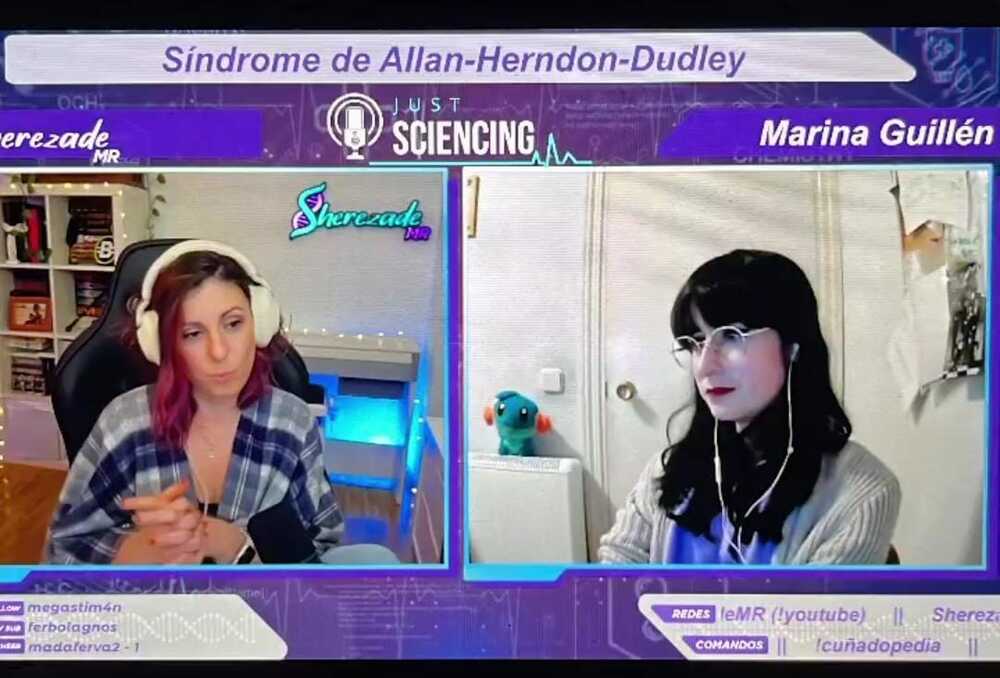
Most of the activities carried out by IIBM researchers have taken place in educational centres in the Community of Madrid. Sandra Franco Caspueñas visited the IES Torrente Ballester on two occasions. There she delighted all the 1st and 2nd year Baccalaureate groups with her conference: "When I grow up I want to be a scientist".
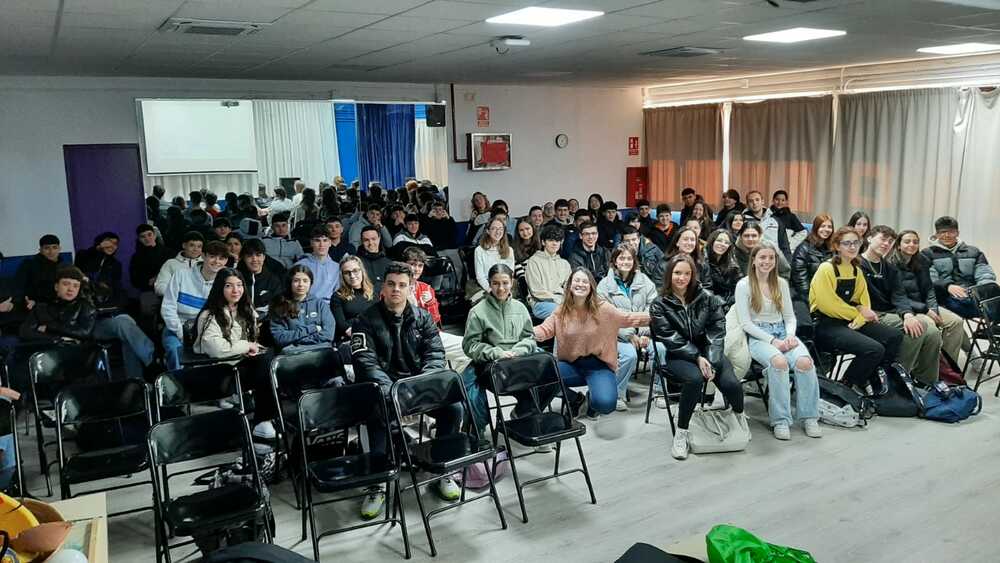
Gemma Ferrer Mayorga gave a conference at the Virgen de Mirasierra School to explain her scientific career after 10 years researching cancer to the students of the 2nd year of Bachillerato, as well as participating in the programme "Conócelas 2023".
Eva Pérez Guijarro, who has recently joined the Cancer Department of our Institute, visited the Santa Gema Galgani School to explain to the 6th year primary school children the studies she carried out, the schools and the University she attended, as well as all the research centres where she has worked.
María Monsalve and Laura Doblado attended the last day of February at IES Valdebernardo to present the conference "My encounter with genes" to the students of the 2nd year of Bachillerato. There, Laura gave details about her scientific career until she became a pre-doctoral student, and about her doctoral thesis project on the metabolic side effects of antipsychotics.
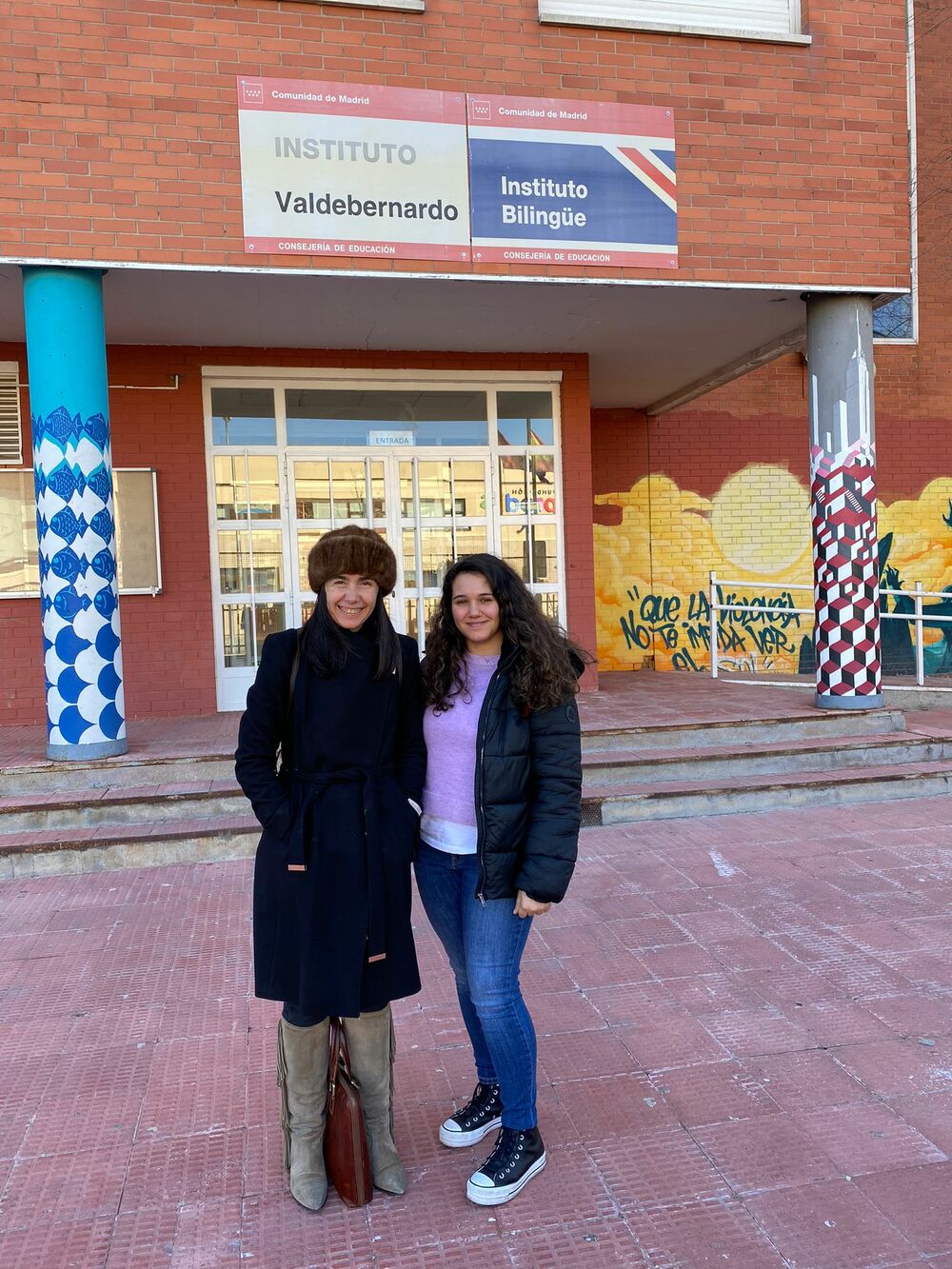
Ángela Martínez-Valverde was invited by IES Gómez Moreno to talk about obesity and other related diseases to students in 4th ESO and 1st Baccalaureate.
Celia López Menéndez attended the Príncipe Felipe School to present her talk "Mummy, Daddy, I want to be a scientist" to 5th and 6th year primary school children.
Paula Pallarosa, the youngest of our science communicators, from Alberto Bartolomé's group, contributed to the 11F campaign by giving a scientific workshop with students in the 4th year of primary education at Mirasur School in Pinto.
Belén Peral visited IES Cervantes to give a presentation on stress reduction skills to the students of two groups of 1st Baccalaureate: International and Scientific Culture.
Pilar López-Larrubia's group: Nuria Arias, Raquel González, Lidia Esteban, Laura Alarcón and María José Guillén went one morning to Calasanz School in Pinto to explain what magnetic resonance imaging is and its applications in biomedicine. They entitled their conference: "A women's research group". All the ESO groups, from first to fourth grade, were the lucky ones to receive Pilar's laboratory in its entirety.

The IIBM would like to thank all the participants of the 11F 2023 campaign, who with their voice have spread their passion and enthusiasm for Science, promoting scientific culture in society, especially among the youngest.
